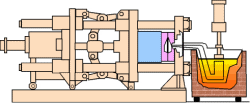The Advantages of Zinc Die Casting Process. Die casting is method that requires the use of high-pressure in pushing molten metal into mold cavities which are designed as wanted. Die casting is often used in the castings of nonferrous metals such as zinc, copper, lead, magnesium, tin based alloys and zinc. This process is best suitable in the production of parts with tiny or medium size demanding large amounts in production. This process is exceedingly regarded as bendable, thus becoming broadly utilized zinc casting method in the metalworking business.
Zinc die casting process is appropriate in the production of parts which necessitate a variety of shapes, ranging from the easiest to the intricate designs. Die casting, as compared to other processes, is appropriate for the production of zinc parts of a mixture of measurements as to its width. This technique has an outstanding dimensional accuracy and is acknowledged to create parts which have silky cast surfaces. It has the aptitude to cast slimmer walls as compared to sand casting and permanent mold casting. Through this process, threaded inserts, heating elements and high strength bearing surfaces can be cast-in. This technique also lessens or erases the need for secondary machining operations. Another characteristic of the use of this zinc die casting process is that it has quick production rate and has a casting tensile strength as high as 415 MPa.
Die casting utilizes a system which has a speedy cycle time and has a suitable casting machine for melting the metal. Die casting technique uses two types of die casting machines: the hot-chamber machines and the cold-chamber machines.


